Table of Contents
Daily Current Affairs for Government Exams:
Today Current Affairs: 27th January 2020 for UPSC IAS exams, State PSC exams, SSC CGL, State SSC, RRB, Railways, Banking Exam & IBPS, etc.
Contents:
- A-SAT and ADTCR.
- Excavations at Nagardhan
- Rashtriya Uchchatar Shiksha Abhiyan (RUSA):
- Padma Awards 2020:
- Bharat Parv 2020
- The Central Adoption Resource Authority (CARA):
- sexual abuse of children.
- India Brazil relationship.
- Jeevan Raksha Padak.
- Tatrakshak Medals.
- Reservation for persons with disabilities:
- Bodo Agreement
- Oslo Accords
- other important current affairs.
1. A-SAT and ADTCR:
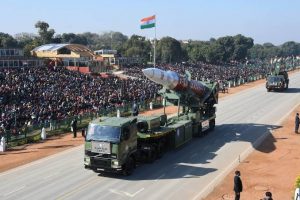
The Defence Research and Development Organisation (DRDO) displayed its Anti-Satellite (A-SAT) missile and the Air Defence Tactical Control Radar (ADTCR) during the 71st Republic Day parade.
- Additionally, the Indian Air Force ’s (IAF) latest inductions, Chinook heavy-lift helicopters, and Apache attack helicopters, took part in the Republic Day flypast.
- Moreover, the Army showcased its recent induction, the 155-mm Dhanush towed howitzer and K9-Vajra self-propelled artillery gun.
A-SAT Missile:
- It is an interceptor missile that destroys or jams satellites in space.
- There are two types of A-SATs:
Kinetic A-SATs, like ballistic missiles, physically strike an object in order to destroy it.
Non-Kinetic A-SATs are the ones that use non-physical means to disable or destroy space objects, which include frequency jamming, blinding lasers or cyber-attacks. - The theoretical maximum range of A-SATs is limited which means satellites above 20,000 km are out of range.
India’s Test of A-SAT Missile - On 27th March 2019, India successfully conducted a Kinetic Anti-Satellite (A-SAT) missile test from Dr. APJ Abdul Kalam Island launch complex (Odisha).
- The A-SAT missile was developed by the DRDO under Mission Shakti.
- Mission Shakti seeks to defend India’s space assets and thus aims at strengthening India’s overall security.
- India became the fourth country to acquire such technology after the USA, Russia, and China.
Air Defence Tactical Control Radar:
- Air Defence Tactical Control Radar (ADTCR) is used for volumetric surveillance, detection, tracking and friend/foe identification of aerial targets of different types and transmission of prioritized target data to multiple command posts and weapon systems.
- It is also capable of detecting very small targets and low flying targets
2. Excavations at Nagardhan:
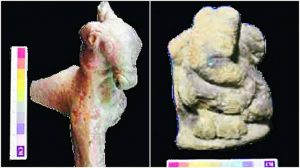
Recent archaeological excavations at Nagardhan, near Nagpur, have provided concrete evidence on the life, religious affiliations and trade practices of the Vakataka dynasty that ruled parts of Central and South India between the third and fifth centuries.
- Nagardhan is a large village in Nagpur district, about 6 km south of Ramtek taluka headquarters.
- Nagardhan served as the capital of the Vakataka kingdom.
- It is the first time clay sealings have been excavated from Nagardhan.
- The oval-shaped sealing belongs to the period when Prabhavatigupta was the queen of the Vakataka dynasty. It bears her name in the Brahmi script, along with the depiction of a conch. The presence of the conch, scholars say, is a sign of the Vaishnava affiliation that the Guptas held.
- An intact idol of Lord Ganesha, which had no ornaments adorned, too was found from the site.
- This confirmed that the elephant god was a commonly worshipped deity in those times.
- Researchers found animal rearing to be one of the main occupations.
- Remains of seven species of domestic animals, cattle, goat, sheep, pig, cat, horse and fowl were traced in an earlier study by the team
3. Rashtriya Uchchatar Shiksha Abhiyan (RUSA):
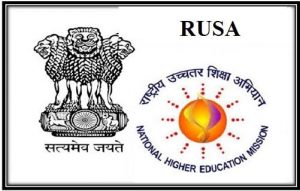
The Ministry of Human Resource Development has approached the Prime Minister’s Office (PMO) to take notice of the alleged corruption in the implementation of the Rashtriya Uchchatar Shiksha Abhiyan (RUSA).
- The alleged acts of corruption in the implementation of RUSA were discovered in July 2019 after the Tata Institute of Social Sciences (TISS) director pointed out serious irregularities in the utilization of funds.
Rashtriya Uchchatar Shiksha Abhiyan:
- RUSA is the centrally sponsored scheme launched in October 2013 that aims at providing strategic funding to higher education institutions throughout the country.
- The scheme is being operated in mission mode for funding state universities and colleges to achieve the aims of equity, access, and excellence.
- Funding is provided by the central ministry through the State governments and Union Territories (UTs), which in coordination with the Central Project Appraisal Board monitors the academic, administrative and financial advancements taken under the scheme.
- Since 2016-17, the government has spent an average of Rs 1,500 crore every year on RUSA.
4. Padma Awards 2020:
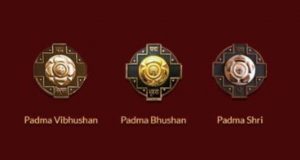
On January 26, 2020, the Government of India announced 141 Padma Awards on the occasion of 71st Republic Day celebrations.
- Former Union Ministers George Fernandes, Arun Jaitley, and Sushma Swaraj are to be awarded Padma Vibhushan posthumously. Former PM of Mauritius Anerood Jugnauth, Boxer MC Mary Kom, Hindustani classical vocalist Chhannulal Mishra is also to be awarded the prestigious award.
- The former CM of Goa Manohar Parrikar is to be conferred with the award posthumously.
- Two Bangladeshis are to awarded honored with Padma awards as well. It includes the High Commissioner of Bangladesh to India Mr. Syed Muazzem Ali who passed away in 2014. He rebelled against the Pakistani Government and declared his allegiance to Bangladesh in 1971. He was serving in the Pakistan embassy during his allegiance.
Padma Awards:
- The awards are one of the highest civilian honors of India.
- The awards are presented in three categories namely Padma Vibhushan, Padma Shri and Padma Bhushan.
- The awards are conferred based on the recommendations made by the Padma Awards Committee. The committee is constituted by the Prime Minister every year.
- However, the nomination process is open to the public as well.
- Even self-nominations are allowed.
- Padma Vibhushan is awarded for exceptional and distinguished services.
- Padma Shri is awarded for distinguished service and
- Padma Bhushan is awarded for distinguished service of a high order.
- The awards are presented by the President of India usually in the month of March/April every year.
- The award does not amount to a title and cannot be used as a suffix or prefix to the awardees’ name.
- The total number of awards to be given in a year (excluding posthumous awards and to NRI/foreigners/OCIs) should not be more than 120.
List of Padma Vibhushan Awardees (7):
- George Fernandes (Posthumous), Public Affairs, Bihar
- Arun Jaitley (Posthumous), Public Affairs, Delhi
- Anerood Jugnauth, GCSK Public Affairs, Mauritius
- C. Mary Kom, Sports, Manipur
- Chhannulal Mishra, Art, Uttar Pradesh
- Sushma Swaraj (Posthumous), Public Affairs, Delhi
- Vishveshateertha Swamiji (Posthumous), Others-Spiritualism, Karnataka
List of Padma Bhushan Awardees (16):
- Manohar Parrikar (Posthumous), Public Affairs, Goa
- V. Sindhu, Sports, Telangana
- Mumtaz Ali (Sri M), Others-Spiritualism, Kerala
- Syed Muazzem Ali (Posthumous), Public Affairs, Bangladesh
- Muzaffar Hussain Baig, Public Affairs, JK
- Ajoy Chakravorty, Art, West Bengal
- Manoj Das, Literature & Education, Puducherry
- Balkrishna Doshi, Others-Architecture, Gujarat
- Krishnammal Jagannathan, Social Work, Tamil Nadu
- C. Jamir, Public Affairs, Nagaland
- Anil Prakash Joshi, Social Work, Uttarakhand
- Tsering Landol, Medicine, Ladakh
- Anand Mahindra, Trade and Industry, Maharashtra
- N R Madhava Menon (Posthumous), Public Affairs, Kerala
- Jagdish Sheth, Literature and Education, USA
- Venu Srinivasan, Trade and Industry, Tamil Nadu
5. Bharat Parv 2020:
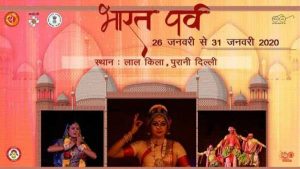
The annual event Bharat Parv is being celebrated from 26th to 31st January 2020 in New Delhi.
- To encourage Indians to visit different tourist places of India and to inculcate the spirit of ‘Dekho Apna Desh’.
- The theme for the Year 2020: ‘Ek Bharat Shreshtha Bharat’ and ‘Celebrating 150 Years of Mahatma’.
- It is organized by the Ministry of Tourism.
- It includes highlights of the Republic Day Parade Tableaux, performances by the Armed Forces Bands, theme pavilions of different States and Central Ministries and cultural performances from different regions of the country.
6. The Central Adoption Resource Authority (CARA):
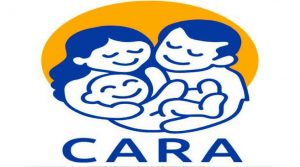
The Central Adoption Resource Authority (CARA) has begun a nationwide capacity building program for social workers who help assess the suitability of the adoptive family and prepare a child for a new home.
- Central Adoption Resource Authority (CARA) is the nodal body for the adoption of Indian children.
- It regulates in-country and inter-country adoptions (in accordance with the provisions of The Hague Convention on Inter-Country Adoption, 1993, ratified by Government of India in 2003).
- It is an autonomous body of the Union Ministry of Women and Child Development.
- The mandatory registration of Child Care Institutions (CCIs) and linking to CARA has been provided in Juvenile Justice (Care and Protection of Children) Act, 2015
7. Sexual abuse of children:

The Adhoc Committee of the Rajya instituted by Chairman Venkaiah Naidu has made 40 recommendations to prevent sexual abuse of children and to contain access to and transmission of child pornography content on social media.
- A clause to be inserted in the POCSO Act, 2012 under which advocating or counseling sexual activities with a person under the age of 18 years is made an offense under the Act.
- National Cyber Crime Reporting Portal shall be designated as the national portal under-reporting requirements in the POCSO Act in case of electronic material;
- A new section be included in the IT Act 2000, providing for punitive measures for those providing pornographic access to children and also those who access, produce or transmit Child Sexual Abuse Material(CSAM);
- Apps that help in monitoring children’s access to pornographic content shall be made mandatory on all devices sold in India.
- On-streaming platforms like Netflix and social media platforms like Twitter, Facebook, etc. should have a separate adult section where under-aged children could be disallowed;
- National Commission for Protection of Child Rights(NCPCR) should be designated as the nodal agency to deal with the issue of child pornography.
- The National Crime Records Bureau (NCRB) shall mandatorily record and report annually cases of child pornography of all kinds.
8. India – Brazil relations:

Brazilian President Jair Bolsonaro was the chief guest at India’s Republic Day celebrations.
- The Chief Guest at the Republic Day parade is accorded India’s highest honor in protocol terms.
- The two sides also concluded 15 agreements/MoU on a variety of issues including an action plan to deepen their strategic partnership.
- Under the action plan, existing mechanisms, as well as goals, have been grouped into six major thematic areas.
- The India-Brazil Joint Commission for political, economic, scientific, technological and cultural cooperation will be the main forum for monitoring the implementation of the Action Plan and will convene every two years, the action plan states.
MoUs/Agreements exchanged during the Visit:
- MoU for establishing a nodal institution in India to carry out research on Bioenergy.
- Investment Cooperation and Facilitation Treaty.
- Agreement on Mutual Legal Assistance in Criminal Matters.
- MoU on cooperation in the field of Traditional Systems of Medicine and Homeopathy.
- Cultural Exchange Programme for the period 2020-2024.
- MoU between Invest India and the Brazilian Trade and Investment Promotion Agency.
9. Jeevan Raksha Padak:
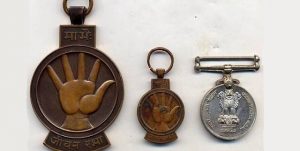
President of India Ram Nath Kovind has approved the conferment of Jeevan Raksha Padak Series of Awards – 2019 on 54 persons.
- Jeevan Raksha Padak’s series of awards are given to a person for a meritorious act of human nature in saving the life of a person.
- The award is given in three categories, namely,
- Sarvottam Jeevan Raksha Padak,
- Uttam Jeevan Raksha Padak and
- Jeevan Raksha Padak.
- Recent winners: This includes Sarvottam Jeevan Raksha Padak to seven, Uttam Jeevan Raksha Padak to eight and Jeevan Raksha Padak to 39 persons. Five awards are posthumous.
10. Tatrakshak Medals:
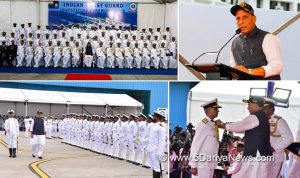
The President of India has approved Tatrakshak Medals to the personnel of the Indian Coast Guard for their act of conspicuous gallantry/meritorious service on the occasion of Republic Day 2020.
- He awarded three Tatrakshak Medals (Gallantry) and two Tatrakshak Medal (Meritorious Service) to the Indian Coast Guard personnel for their act of conspicuous gallantry and distinguished/meritorious service.
- These awards are being given to the personnel of the Indian Coast Guard on Republic Day and Independence Day every year, since January 26, 1990, onwards.
11. Reservations for persons with disabilities:

Supreme court (SC) has affirmed a 3% quota for disabled persons both in direct recruitment and in promotions in PSUs.
- The Supreme Court has granted relief to persons with disabilities by allowing reservation in promotion in all groups for those employed in public sector jobs. It confirmed that a 3% reservation should be given to disabled persons both in direct recruitment and in promotions.
- Reservation for disabled is granted under Article 16(1) of the Constitution.
- Persons with Disabilities (Equal Opportunities, Protection of Rights and Full Participation) Act, 1995 emphasizes that “employment is a key factor in the empowerment and inclusion of people with disabilities.
- The judgment confirms a 2016 verdict of the top court in Rajeev Kumar Gupta’s case that granted reservation in promotion to disabled persons employed in Groups A and B in addition to Groups C and D in the public sector.
- The 2016 judgment had held that wherever posts were identified to be suitable for persons with disabilities, a 3% reservation must be given.
- The government had however challenged the judgment, leading to the reference to the larger Bench.
- The government had referred to the Indira Sawhney case, which had capped reservations at 50% and prohibited reservation in promotions.
- But supreme court countered that the Sawhney judgment only pertained to the Backward Classes. It has no relevance to the case of persons with disabilities.
12. Bodo Agreement:
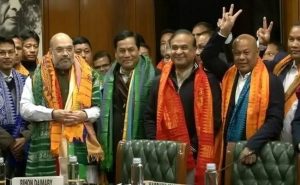
The Government of India signed the historic agreement with the nine factions of the National Democratic Front of Bodoland (NDFB).
- According to the agreement, the Bodoland Territorial Area District will hold special rights for the locals. However, the outsiders will have to obtain “permit” to work in the territory.
- The agreement will provide political rights to the Bodo Tribals living in Assam. The agreement was signed in the presence of Home Minister Amit Shah and Assam Chief Minister Sarbanand Sonowal and the leaders of the NDFB.
- The Agreement will also provide economic benefits to the Bodos.
Bodo Accord – Bodoland Territorial Area District
- The accord signed is the third agreement signed in 27 years.
- The first was signed with All Bodo Students Union in 1993 and the second was signed with the Bodo Liberation Tigers in 2003.
- The third agreement led to the formation of the Bodoland Territorial Council under the Sixth Schedule of the Constitution.
- The BTC now administrates 4 districts in Assam namely Chirang, Kokrajhar, Baska and Udalguri.
- These areas are called the Bodoland Territorial Area Districts.
13. Oslo Accords:

Palestinians threaten to quit Oslo Accords if U.S. President Donald Trump announces his West Asia peace plan next week.
- The main worry is that this initiative will turn Israel’s “temporary occupation (of Palestinian territory) into a permanent occupation”.
- The Palestinians see east Jerusalem as the capital of their future state and believe Mr. Trump’s plan buries the two-state solution that has been for decades the cornerstone of international West Asia diplomacy.
- Under the Oslo Accords of 1993, both Israel and the Palestinians agreed that the status of settlements would be decided by negotiations. But the negotiations process has been all but dead for several years now.
- Israel walked into East Jerusalem in 1967 and subsequently annexed it. For Israel, Jerusalem is non-negotiable.
- The Palestinians want East Jerusalem as the capital of their future state.
- Most of the world’s nations look at it as occupied territory.
About the Oslo Accords:
- Formally known as the Declaration of Principles (DOP), the pact established a timetable for the Middle East peace process. It planned for an interim Palestinian government in Gaza and Jericho in the West Bank.
- Oslo II officially called the Israeli-Palestinian Interim Agreement on the West Bank and Gaza, expanded on Oslo I.
- It included provisions for the complete withdrawal of Israeli troops from six West Bank cities and about 450 towns. Additionally, the pact set a timetable for elections for the Palestinian Legislative Council.
Other important current affairs:
1. According to the Mahatma Gandhi National Rural Employment Guarantee Act (MGNREGA) scheme’s financial statement as on 26th January 2020, the center is on the verge of running out of funds for the scheme.
- More than 96% of the allocated money has already been spent or is needed to pay pending dues, with less than ₹2,500 crores left to sustain the scheme for the next two months.
- Budget Allocation: The budget allocation for 2019 for the MGNREGA scheme was ₹60,000 crores which is lower than the amount spent in 2018.
- Many state governments have not paid the wages to workers as the Centre has not released funds. It is contrary to the spirit of the Act and violates the principle of rights-based implementation of the MGNREGA scheme.
- The Central Employment Guarantee Council has not met in two years despite it being mandatory to hold a meeting every six months.
2. The Global Potato Conclave is to be held between January 28 and January 31, 2020.
- PM Modi is to address the conclave.
- After rice and wheat, potato is the third most important food crop in the world.
- The growth of potato has increased by 40% between 1961 and 2016.
- However, the area under potato production has decreased from 22.14 million hectares to 19.24 million hectares.
3. The NBA (National Basketball Association) star Kobe Bryant died in a helicopter crash.
- He retired from the game in 2016. He has won two gold medals in the Olympics, one in 2008 and the other in 2012. The star had won 5 championships so far.
- Kobe Bryant was the first guard in American history to play 20 seasons. He was also a five-time champion. He won the championship in 2000, 2001, 2002, 2009 and 2010.
- The NBA is a basketball league located in North America. It is composed of 30 teams. It was founded in New York City in 1946.
- NBA is one of the four major sports league USA. The other 3 major sports league include Major League Baseball, National Football League and National Hockey League.
- All the four leagues are commonly referred to as “Big Four”.
4. Shiv Bhojan Scheme:
- At the 71st celebrations of Republic Day, Maharashtra Government launched the Shiv Bhojan Scheme.
- The scheme will offer meals at Rs 10 to the poor.
- The scheme aims at providing affordable, quality food to all.
- The State Government has estimated that the scheme would cost Rs 6.4 crores and is expected to run for three months.
5. “PolyCrack” Technology:
- The East Coast Railways commissioned the first waste-to-energy plant of Railways sector of India. It is the fourth such plant in the country. The plant has been set up at a cost of Rs 1.79 crores with Polycrack technology.
- The plant installed converts waste collected from the garbage disposal units into carbon powder, diesel and gas using Polycrack Technology.
- The diesel oil is to be sold by the Railways to other stakeholders for commercial purposes. The gas and carbon powder is to be used in brick manufacturing. The best thing about the plant is that it does not leave any waste at the end.
- In Polycrack Technology, waste is processed and reformed in 24 hours. The only drawback is that it requires a larger area. The technology involves depolymerization, cracking, reforming, scrubbing, particle filtration and rapid quenching.
6. The Oscar-nominated World War I drama ‘1917’ was recently released in India which is based on Operation Alberich.
- Operation Alberich was the code name of a German military operation in France during the First World War.
- Alberich was a planned strategic withdrawal to new positions on the shorter and more easily defended Hindenburg Line, which took place between 9 February and 20 March 1917.
7. Globally, unprovoked shark attacks have been declining in the last two years, according to the International Shark Attack File (ISAF) compiled by the University of Florida.
- There were 64 unprovoked bites in 2019, roughly in line with 2018’s 62 bites, and about 22% lower than the most recent five-year (2014-18) average of 82 incidents a year.
- The recent decline may reflect changes in the migration patterns of blacktip sharks.
8. The Reserve Bank of India (RBI) has issued the revised guidelines for Merchanting Trade Transactions (MTT) under the Foreign Exchange Management Act (FEMA), 1999.
- In the Indian context, the trade is called Merchanting Trade when,
- The supplier of goods will be resident in one foreign country
- The buyer of goods will be resident in another foreign country
- The merchant or the intermediary will be resident in India
- Merchanting transaction is one that involves the shipment of goods from one foreign country to another foreign country involving an Indian Intermediary. Hence, It is also called Intermediary Trade.
- According to revised guidelines, for a trade to be classified as merchanting trade, goods acquired shall not enter the Domestic Tariff Area.
- Also, the entire MTT shall be completed within an overall period of nine months.
9. Astronomers have recently found that the funneling of matter into a forming star happens at different rates over time, as per the rotating disc of gas and dust theory.
- Sometimes the forming star swallows up a huge amount of matter, resulting in a burst of activities in the massive star. This is called an accretion burst event.
- It is incredibly rare: only three such events have been observed, out of all the billions of massive stars in the Milky Way.
10. The International Labour Organization has released a report titled “World Employment and Social Outlook: Trends 2020”.
- It predicts that unemployment is like to increase by around 2.5 million in 2020.
- The report also revealed that after nine years in decline, the rate of global unemployment remained unchanged in 2019, at 5.4%.
- It is expected to stay the same for the next two years, due to fluctuations in the population seeking work.
11. The Government of India (GoI) has planned to set up a first-of-its-kind war memorial for service animals in Meerut Uttar Pradesh.
- India’s first war memorial for animals including dogs, horses, and mules will be dedicated to the contributions and heroics of animals who lost their lives in counter-insurgency operations in Kashmir and in the battlefield during the Kargil War while helping the Army.
12. The government issued the preliminary information memorandum for 100% stake sale in national carrier Air India.
- As part of the strategic disinvestment, Air India would also sell a 100 percent stake in low-cost airline Air India Express and 50% shareholding in joint venture AISATS.
- The government has set 17th March as the deadline for submitting the Expression of Interest (EOI).




